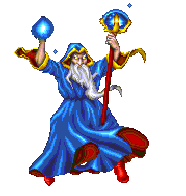Why Can't RPGs Generate Role-Playing?
"Role-playing does not and should not invent rules—it should only interpret them."
We've all been there—the dream, the fantasy of our character or a great, involved story, always dreamt outside the game that is supposed to be able to make it a reality. But why? Why is it that when gamers get together, these thousand-page books of carefully thought out rules seem unable to do little more than provide bickering-fodder for friends that quickly become enemies, either with characters that kill each other or as players arguing at the communal table? The best laid plans of players and gamemasters alike are usually made with strong ideals for a great, memorable adventure, though we all know that they seldom turn out that way. So why do we continually pursue a losing proposition? Do we really enjoy the inner pain? Do we truly find fun in expressing our deepest dreams only to have them tossed into the psychological wrestling ring with a bunch of brutish players that are just looking for a way to kill time (and dreams)? I personally love game-satire like 'Knights of the Dinner Table' and the Dead Gentlemen film 'The Gamers'. But as these funnies show us the 'bad' side of gamers, that they are so popular bespeaks that we all have been there and can identify with what they are going through, for nothing strikes a smile or evokes a laughter as much as truth. We almost need such humor in order to cover up the pain of countless failed attempts at living the elusive dream of a 'great role-playing game'. What is our quest? Where lies our grail?'
I believe there is indeed a solution to this, and the proof that it is there is in the undying devotion we all have to these games. No, we do not enjoy laying out our carefully thought-through stories on the table only to have them reduced to hack-fests. Yet we pursue the elusive 'true role-playing experience' because we know it's possible to achieve. Now, it's easy to blame players with whom one has disagreed with (or argued with, or thrown dice at, etc). But it is much easier to overlook the game system itself as being at fault, since we have already accepted it for ourself. And so if players are easily interchanged and humans will always have their preferences, finding good players should be just as easy as stumbling across disagreeable ones. But if games fall apart so often, then perhaps the problem lies somewhere else, indeed not in the players at all. The players are only playing the game. Is it possible then that the role-playing game itself does not provide a suitable opportunity for role-playing? Without realizing it, most of us have already agreed with this idea, as proven by our needing to modify the rules with 'house-rules' at the first opportunity. But the true nature of the beast is the corporate packaging of these products, which are designed for a bottom line, indeed a quarterly report, and not for the art that is necessary to cater to the dreams and fantasies of players.
That is what New Dimension Games is all about—providing a system that does not block attempts at being serious about the game, by not favoring hack-and-slash or power-mongering, but by being neutral and balanced as far as player preferences and being too simple to allow rules-lawyers to abuse it. Indeed, it is almost as if, when a game goes bad, we are competing with the rules, when the rules should be there to compliment our fantasies and provide a stage for them. But by the overly complex nature of some mass-produced books, their sheer volume encourages survival by finding loopholes and power attained by conquest alone, leaving little or no incentive to role-play. But what if, just what if, a rule system was simple enough that looking for loopholes was clearly a waste of time because the rules were clear and certain, and power was undeniably achieved through courage rather than luck, thus leaving all players on a level playing field so-to-speak, having to truly sweat out those dice rolls and count those XPs?
I believe that many gamers—most of them for certain—deep down are weary of hollow victories, you know, nobody dying because the GM was fudging rolls for them, or the opposite, with the GM wanting so much to see his planned drama unfold that he'll go out of his way to kill of characters. Either way, it's a testament to game rules statistically favoring player characters or their enemies, rather than favoring the creation of a role-playing environment. Too many games try too hard to be 'realistic', to account for every detail, to in essence create a 'virtual reality' tabletop game, when an RPG is truly a shared story, an interactive dream, whose memories are more precious than its points, or at least they should be. Truly, more gamers can offer up war stories of past character follies, foolish deaths, bad dice rolls and humor at the expense of their friends than they can stories of achieving the dreams that were so strong when they wrote up that ten-page history for their new character. But why must the dramatic memories be based on what bad rolls or the dumb mistakes of distracted players created? Again, can't all that energy spent in conjuring, creating and crafting one's character be justified?
Yes, it can, and the answer lies in simpler rules, where there is less arguing about them and more concern spent on how to sneak past that statue without it coming to life . . .

If you wish to use the proper fonts for this and other pages they are available here as a zip file.















